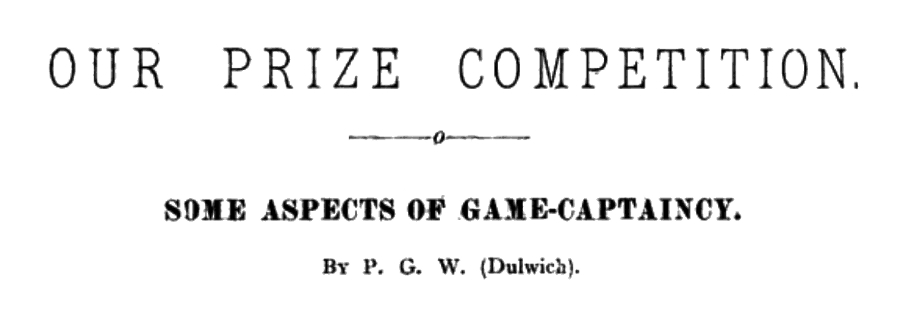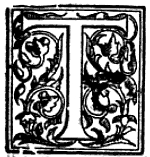Public School Magazine, February 1900

 O
the Game-Captain (of the football variety) the world is peopled by
three classes, firstly the keen and regular player, next the partial slacker,
thirdly, and lastly, the entire, abject and absolute slacker.
O
the Game-Captain (of the football variety) the world is peopled by
three classes, firstly the keen and regular player, next the partial slacker,
thirdly, and lastly, the entire, abject and absolute slacker.
Of the first class, the keen and regular player, little need be said. A keen player is a gem of purest rays serene, and when to his keenness he adds regularity and punctuality, life ceases to become the mere hollow blank that it would otherwise become, and joy reigns supreme.
The absolute slacker (to take the worst at once, and have done with it) needs the pen of a Swift before adequate justice can be done to his enormities. He is a blot, an excrescence. All those moments which are not spent in avoiding games (by means of that leave which is unanimously considered the peculiar property of the French nation) he uses in concocting ingenious excuses. Armed with these, he faces with calmness the disgusting curiosity of the Game-Captain, who officiously desires to know the reason of his non-appearance on the preceding day. These excuses are of the “had-to-go-and-see-a-man-about-a-dog” type, and rarely meet with that success for which their author hopes. In the end he discovers that his chest is weak, or his heart is subject to palpitations, and he forthwith produces a document to this effect, signed by a doctor. This has the desirable result of muzzling the tyrannical Game-Captain, whose sole solace is a look of intense and withering scorn. But this is seldom fatal, and generally, we rejoice to say, ineffectual.
The next type is the partial slacker. He differs from the absolute slacker in that at rare intervals he actually turns up, changed withal into the garb of the game, and thirsting for the fray. At this point begins the time of trouble for the Game-Captain. To begin with, he is forced by stress of ignorance to ask the newcomer his name. This is, of course, an insult of the worst kind. “A being who does not know my name,” argues the partial slacker, “must be something not far from a criminal lunatic.” The name is, however, extracted, and the partial slacker strides to the arena. Now arises insult No. 2. He is wearing his cap. A hint as to the advisability of removing this piece de resistance not being taken, he is ordered to assume a capless state, and by these means a coolness springs up between him and the G.-C. Of this the Game-Captain is made aware when the game commences. The partial slacker, scorning to insert his head in the scrum, assumes a commanding position outside and from this point criticises the Game-Captain’s decisions with severity and pith. The last end of the partial slacker is generally a sad one. Stung by some pungent home-thrust, the Game-Captain is fain to try chastisement, and by these means silences the enemy’s battery.
Sometimes the classes overlap. As for instance, a keen and regular player may, by some more than usually gross bit of bungling on the part of the G.-C., be moved to a fervour and eloquence worthy of Juvenal. Or, again, even the absolute slacker may for a time emulate the keen player, provided an opponent plant a shrewd kick on a tender spot. But, broadly speaking, there are only three classes.
 Madame Eulalie’s Rare Plums
Madame Eulalie’s Rare Plums